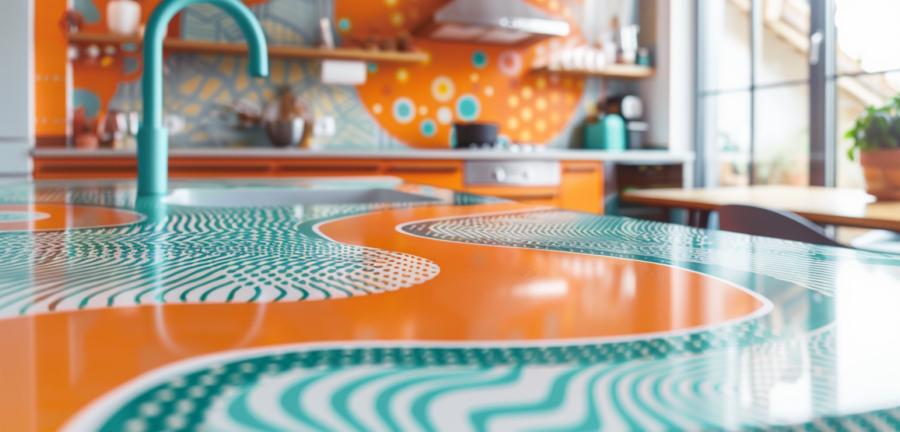Why Your Worktop Deserves an Upgrade
Your kitchen might be lying to you. Those charming wooden counters whisper “rustic elegance,” but what they really mean is “I absorb every drop of red wine like it’s a personal challenge.” Laminate might promise ease, but introduce a hot pan and it melts faster than your resolve during a midnight snack. Granite can be glorious—until the sealing schedule becomes more complicated than your taxes.Which brings us to porcelain and its slightly flashier cousin, ultra-compact surfaces like Dekton. These aren’t your grandmother’s counters. These are the quiet workhorses of modern kitchens—sleek, unbothered, and smugly resistant to the sort of domestic chaos most materials buckle under.
What Exactly Is an Ultra‑Compact Surface?
You’ve likely seen the term “ultra‑compact” tossed around like it’s part of some high-tech appliance pitch. But this is no marketing fluff. Surfaces like Dekton are made by subjecting a mix of raw materials—quartz, porcelain, and glass—to extreme heat and pressure. We’re talking over 1200°C and 25,000 tons of pressure. It’s like making a countertop in the core of a small planet.The result? A virtually indestructible slab that scoffs at heat, shrugs off scratches, and doesn’t even notice when you spill coffee, curry, or wine on it. And it doesn’t require sealing. Ever. You could ignore it entirely and it would still outlast your enthusiasm for air fryers.
Porcelain vs Dekton: Are We Splitting Hairs?
Porcelain worktops are made from refined clay baked at high temperatures. They’re thinner, often more affordable, and come in a huge range of finishes—from matte to glossy, marble-look to industrial chic. They’re perfect for anyone who wants a clean, modern look without inviting a maintenance headache.Dekton takes that idea and basically cranks it up to 11. It’s a brand name for a specific kind of ultra‑compact surface that combines raw materials through a process called “Sinterized Particle Technology”—which sounds complicated enough to justify the price tag. It’s thicker, heavier, and can be used literally everywhere: floors, walls, exteriors, your neighbor’s envy.
In practical terms: if porcelain is your reliable friend who shows up on time and helps you move, Dekton is their cousin who brings power tools and somehow builds you a deck before lunch.
Maintenance Routine (Or Lack Thereof)
This is the part that gets people oddly excited. No sealing. No polishing. No weekly rituals involving mineral oil and whispered prayers.Daily care is laughably simple:
- Wipe it down with warm water and a mild detergent.
- Don’t bother with specialty cleaners—you’re not dealing with a diva.
- Dropped a hot pan on it? Cool. Literally.
Design Flexibility That Doesn’t Scream “Trendy”
You don’t need to be chasing the kitchen version of fast fashion to appreciate these surfaces. Whether you’re building a warm, minimalist aesthetic or going full brutalist because you’ve seen too many Scandinavian interiors on Pinterest, these materials can match it.They’re available in finishes that mimic concrete, natural stone, metal, or even oxidized steel (if you’re really leaning into your post-apocalyptic vision). The beauty lies in how subtle they can be—strong enough to survive a clumsy teenager with a cleaver, but visually quiet enough to let your lighting or cabinetry do the talking.
What They’re Not Great At (Yes, There’s a Catch)
Nothing’s perfect—except maybe a well-made grilled cheese at 2am. Porcelain and ultra-compact surfaces, while impressively durable, do come with a few limitations worth noting.First, installation is not a DIY job. These materials are heavy, dense, and require specialist cutting tools unless you’re into the idea of cracking a thousand-pound slab and watching your renovation budget evaporate in real time. Leave it to the pros unless you’re planning to turn your kitchen into an avant-garde sculpture garden.
Second, while they’re tough, they’re not totally immune to damage. Drop a cast iron skillet directly on the edge and you might chip it. Think of it like a bodybuilder with fragile shins—impressive in the middle, but be kind to the corners.
Environmental Considerations
Here’s a pleasant surprise: both porcelain and ultra-compact surfaces score fairly well on the eco‑scale. Many brands use recycled materials, and the longevity factor alone helps reduce waste—one countertop that lasts decades is better than three that get binned every ten years.Some options are certified low-VOC and nonporous, which means you’re not growing secret colonies of bacteria after a week of questionable chopping practices. And because they don’t need chemical sealers or constant maintenance, you’re reducing the household’s reliance on weird niche cleaning products that always smell like lemons and existential dread.
Who’s It For, Really?
If your kitchen is a place where things *happen*—burnt edges, spilled sauces, inexplicable dents—then yes, these surfaces are speaking your language. Families, home cooks, people who regularly host dinner parties with overly confident wine pourers… all solid candidates.But they’re also great for the obsessively clean, the aesthetically driven, and anyone who wants a counter that can pass for stone, metal, or ceramic tile without actually being high-maintenance. Basically, these surfaces are for people who don’t want their countertops to feel like one more thing that needs managing.
Stone Cold Keepers
You don’t need to understand sintering temperatures or industrial pressure calibrations to appreciate what these surfaces offer. What matters is that they work. They survive heat, resist scratches, won’t stain, and look good doing it. That’s more than you can say for most things in your kitchen, including whoever last tried to make soufflé.Porcelain and ultra‑compact surfaces may not come with the same old-world charm as marble or the nostalgic warmth of butcher block, but that’s precisely the point. They’re for kitchens that want to live—not just look good in listing photos.
In the end, these materials aren’t trying to impress you with grandeur. They’re just quietly being excellent, one pan-scorching, spill-splattered, overcaffeinated day at a time.
Article kindly provided by kitchenworktopsnearme.co.uk


